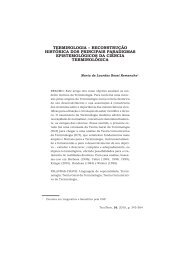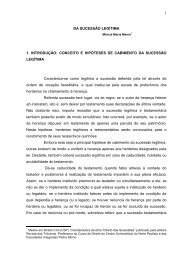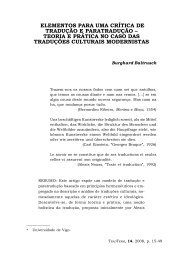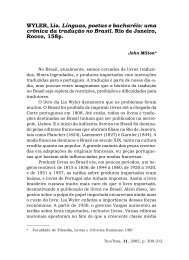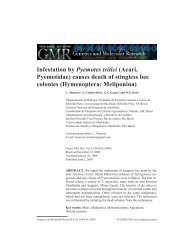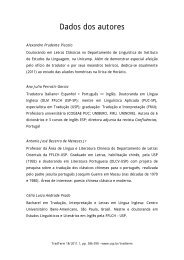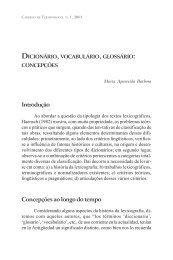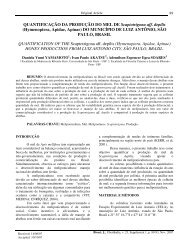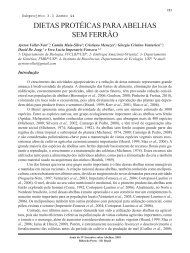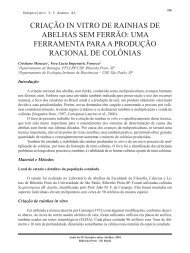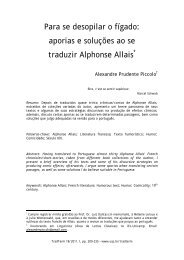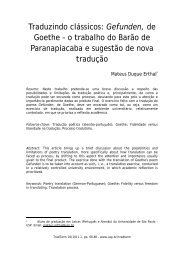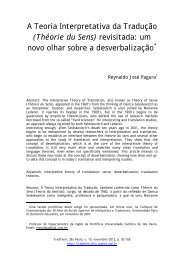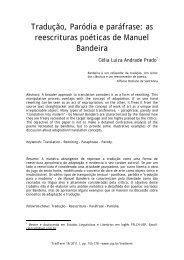Bees as pollinators in Brazil - USP
Bees as pollinators in Brazil - USP
Bees as pollinators in Brazil - USP
Create successful ePaper yourself
Turn your PDF publications into a flip-book with our unique Google optimized e-Paper software.
68<br />
There are misconceptions about how<br />
bees could impact on crops<br />
In some crops, such <strong>as</strong> oranges, there are<br />
misconceptions about the danger of bees<br />
transmitt<strong>in</strong>g plant dise<strong>as</strong>es. Generally, decisions<br />
are made without any real evidence of<br />
such a problem.<br />
There are problems with beekeepers<br />
obta<strong>in</strong><strong>in</strong>g permission to place bees on farmland<br />
- due to fear of the bees <strong>in</strong>terfer<strong>in</strong>g with<br />
cultural practices, while growers are unaware<br />
of the value of poll<strong>in</strong>ation. We need to have<br />
c<strong>as</strong>e studies about how bees <strong>in</strong>teract with<br />
crops and to have documented <strong>in</strong>formation<br />
that will help growers and beekeepers understand<br />
the real effects of bees on crops. Some<br />
of this <strong>in</strong>formation is available from other<br />
countries, and can be adapted and appropriately<br />
communicated. However local experimental<br />
work should also be done to test the<br />
impact of bees under local conditions.<br />
Beekeepers have problems with<br />
hives be<strong>in</strong>g stolen<br />
Apiaries often have to be placed <strong>in</strong> remote<br />
places where the colonies are e<strong>as</strong>ily stolen, due<br />
to <strong>in</strong>appropriate management and fear of the<br />
bees. The government and the police normally<br />
gives little support to the colony owners, and<br />
often take no action, even when there is proof<br />
that colonies or colony products have been<br />
stolen. Policies should be developed to provide<br />
legal and police support to reduce this colony<br />
thievery problem. C<strong>as</strong>e studies need to be<br />
made to f<strong>in</strong>d ways to ma<strong>in</strong>ta<strong>in</strong> apiaries <strong>in</strong> ways<br />
that there is less impact on farm workers and<br />
animals, so that apiaries can be kept <strong>in</strong> more<br />
protected are<strong>as</strong>. Insur<strong>in</strong>g colonies aga<strong>in</strong>st robbery<br />
is also unknown, mak<strong>in</strong>g f<strong>in</strong>ancial security<br />
for the beekeeper nearly impossible.<br />
Problems with pesticides<br />
Presently many honey bee colonies are killed<br />
by pesticides. Beekeepers avoid crops where<br />
<strong>in</strong>secticides are used; this reduces honey production<br />
and agricultural production. Crops<br />
such <strong>as</strong> cotton would be more productive if<br />
the bees could poll<strong>in</strong>ate them. Native bees and<br />
wild honey bee colonies are killed by excessive<br />
and <strong>in</strong>appropriate use of pesticides, mak<strong>in</strong>g it<br />
necessary to br<strong>in</strong>g <strong>in</strong> commercial honey bee<br />
colonies for poll<strong>in</strong>ation purposes. Label<strong>in</strong>g of<br />
these pesticides should <strong>in</strong>clude <strong>in</strong>formation<br />
about toxicity to bees.<br />
C<strong>as</strong>e studies to <strong>as</strong>sess ma<strong>in</strong> pesticide problems<br />
that affect bees<br />
Develop a manual about the use, value and<br />
care of honey bees. Take advantage of c<strong>as</strong>e<br />
studies about improvement of production and<br />
quality of farm products to educate farmers<br />
about how to best <strong>in</strong>corporate poll<strong>in</strong>ation <strong>in</strong>to<br />
their management practices. The impact of<br />
the most commonly used pesticides on flower<strong>in</strong>g<br />
crops should be <strong>in</strong>vestigated.<br />
Farmers and policy makers are often<br />
unaware of the need for poll<strong>in</strong>ation<br />
Growers are often unaware of need for <strong>poll<strong>in</strong>ators</strong><br />
and of poll<strong>in</strong>izer varieties. International<br />
poll<strong>in</strong>ation techniques need to be adapted to<br />
local conditions. The agricultural policies normally<br />
ignore the need for <strong>poll<strong>in</strong>ators</strong>. EMBRA-<br />
PA, SEBRAE and other appropriate <strong>in</strong>stitutions,<br />
such <strong>as</strong> universities, should develop projects to<br />
test the value of poll<strong>in</strong>ation on crops and varieties.<br />
They should also develop crop management<br />
schemes that m<strong>in</strong>imize the impact of<br />
<strong>in</strong>secticides on honey bees. This <strong>in</strong>formation<br />
should then be made available to the farmers.<br />
There should be demonstration fields and<br />
courses to make the farmers aware of how<br />
much they can ga<strong>in</strong> by <strong>in</strong>clud<strong>in</strong>g poll<strong>in</strong>ation <strong>in</strong><br />
their management scheme.<br />
We need clear recommendations about<br />
number and size of colonies needed, and how



